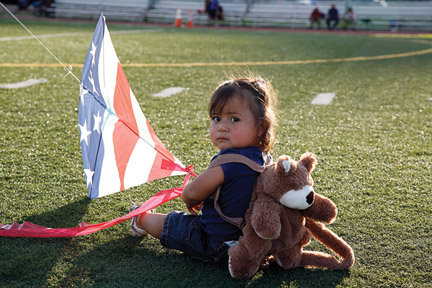Local residents flocked to the Weehawken Waterfront Complex in front of a stunning Manhattan skyline to fly kites Monday night. It was the eve after a storm that would have had Benjamin Franklin envious, but didn’t discourage the new record turnout.
Children young and old brought kites big and small, beautiful, and downright odd. The intermittent breezes caught and dropped the levitating amalgams of hollow sticks and colorful fabrics with a 2,800 year old history of flight.
In its third year, Weehawken’s Kite Night united families and kite aficionados alike, with the sounds of giggling, giddy children and their parents punctuating the air as the sun set behind the Palisade cliffs.
“It’s such a fantastic night for kites,” Weehawken Mayor Richard Turner said, hair blown by the breezes that fueled the fun. “The community really rallies around this event, and it’s great to see everyone come together.”
Where do kites come from?
The Chinese invention is said to predate the birth of Jesus Christ. It came about, historians believe, when the first silk-sailed, silk-stringed, bamboo-framed flying machine was invented by 5th century BC philosophers Mozi and Lu Ban. The paper kite came around 549 AD when history cites its use to send a message for a rescue mission.
Kites were originally used for sending signals as well as for measuring wind and distance, and even for lifting people. They were not the trademark triangle shape they most frequently appear today, but they were often brightly decorated and occasionally had devices attached that made whistling sounds as they caught the wind.
Kites arrived in Europe after regular Asian trade markets were established in the 16th century and became a useful research tool for science.
Then of course there’s the famous story (which may or may not be a rumor) of American statesman Benjamin Franklin, who literally shocked the world when he proved that lightning was most certainly electrical in nature.
“It’s such a fantastic night for kites.” – Mayor Richard Turner
____________
Kite string envy
Rick Saunders stood with what appeared to be a small wheel in the crook of his arm Monday evening, rigged with 3,000 ft. of Kevlar string (“It can withstand 150 pounds of weight,” he said) attached to a much-envied pink and yellow box kite that trailed a 50-foot yellow tail.
“I’m an embarrassment to my wife,” Saunders laughed, as he glanced at Diane D’Agostino and their daughter rolling their eyes a safe distance away. “Last year I had 100 feet of string, but it kept tangling, so I found this reel, and it came with length choices. It was a no-brainer.”
D’Agostino boycotted the evening at first, but in the end chose to watch in case her husband’s string happened to tangle and lift small children off the ground. As his kite took off, kids jumped and chased after its tail like bipedal cats.
“He must be missing something in his life,” she sighed.
“You’ve got kite string envy,” he answered.
As the wind that night was a bit, shall we say, up and down, the kites enjoyed some serious air time punctuated with some serious ground time. Half an hour later, Saunders stood before his kite with a wad of tangled Kevlar in his hand.
“Well, I suppose it isn’t actually tangle proof after all,” he said, as his young fans gathered round to help with the re-launch.
Gennarose Pope may be reached at gpope@hudsonreporter.com
